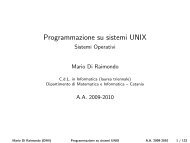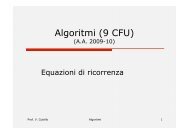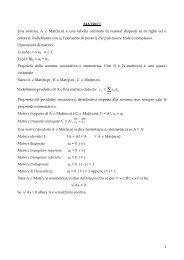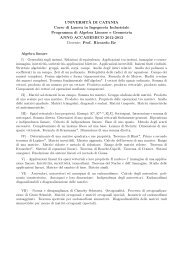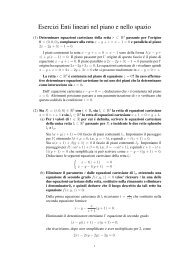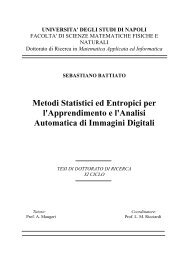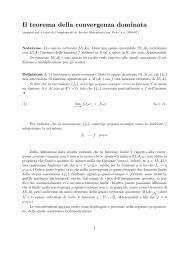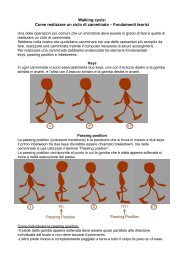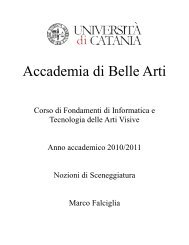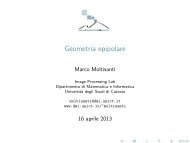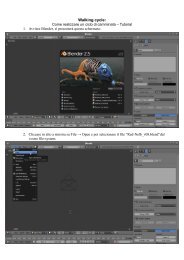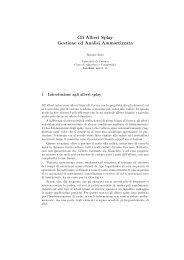Logica Matematica Corso di Laurea in Informatica ... - Mbox.dmi.unict.it
Logica Matematica Corso di Laurea in Informatica ... - Mbox.dmi.unict.it
Logica Matematica Corso di Laurea in Informatica ... - Mbox.dmi.unict.it
Create successful ePaper yourself
Turn your PDF publications into a flip-book with our unique Google optimized e-Paper software.
154 CAPITOLO 7. LINGUAGGI PREDICATIVI<br />
Una legge simmetrica rispetto a quella <strong>di</strong> particolarizzazione, che si chiama<br />
anche <strong>di</strong> generalizzazione esistenziale, o <strong>di</strong> <strong>in</strong>debolimento esistenziale,<br />
afferma che se t è sost<strong>it</strong>uibile a x <strong>in</strong> A allora è logicamente valida<br />
A[x/t] → ∃xA.<br />
Ad esempio, siccome y +(−y) = 0 vale negli <strong>in</strong>teri, si può dedurre ∃x(y +x =<br />
0); qui bisogna pensare che Ax/t] è y + (−y) = 0, con t uguale a −y, e che<br />
è ottenuta da y + x = 0 per sost<strong>it</strong>uzione <strong>di</strong> −y a x. Ma potrebbe essere<br />
stata ottenuta per sost<strong>it</strong>uzione <strong>di</strong> −y a z <strong>in</strong> y + z = 0 e si può altrettanto<br />
correttamente dedurre ∃z(y + z = 0), pensando <strong>di</strong> applicare A[z/t] → ∃zA.<br />
Se si comb<strong>in</strong>ano <strong>in</strong> serie particolarizzazione e generalizzazione esistenziale<br />
si ottiene<br />
∀xA → ∃xA,<br />
che è valida <strong>in</strong> quanto si considerano solo sempre <strong>in</strong>terpretazioni <strong>in</strong> cui<br />
l’universo non è vuoto 15 .<br />
Sono leggi logiche anche le leggi <strong>di</strong> r<strong>in</strong>om<strong>in</strong>a delle variabili v<strong>in</strong>colate del<br />
lemma 7.2.4.<br />
Le leggi <strong>di</strong> r<strong>in</strong>om<strong>in</strong>a seguono anche dalla legge <strong>di</strong> particolarizzazione e<br />
dalle prossime leggi riguardanti con<strong>di</strong>zionale e quantificatori (esercizio).<br />
Altre leggi stabiliscono dei rapporti tra connettivi e quantificatori che<br />
permettono <strong>di</strong> trasformare le formule <strong>in</strong> altre equivalenti con un <strong>di</strong>verso segno<br />
logico pr<strong>in</strong>cipale:<br />
∀x(A ∧ B) ≡∀xA ∧ ∀xB <strong>di</strong>stributiv<strong>it</strong>à <strong>di</strong> ∀ su ∧<br />
∃x(A ∨ B) ≡∃xA ∨ ∃xB <strong>di</strong>stributiv<strong>it</strong>à <strong>di</strong> ∃ su ∨<br />
sono imme<strong>di</strong>ate conseguenze del significato dei simboli logici.<br />
Si possono derivare facilmente con la deduzione naturale (esercizio).<br />
Mentre è pure ovvio che siano logicamente valide<br />
∀xA ∨ ∀xB → ∀x(A ∨ B)<br />
∃x(A ∧ B) → ∃xA ∧ ∃xB,<br />
non valgono le implicazioni <strong>in</strong>verse.<br />
Se ad esempio U è un <strong>in</strong>sieme con due elementi {a, b} e l’<strong>in</strong>terpretazione<br />
<strong>di</strong> P è {a} e l’<strong>in</strong>terpretazione <strong>di</strong> Q è {b}, allora <strong>in</strong> questa <strong>in</strong>terpretazione<br />
∀x(P (x) ∨ Q(x)) è vero, mentre sono falsi sia ∀xP (x) (l’<strong>in</strong>sieme <strong>di</strong> ver<strong>it</strong>à <strong>di</strong><br />
P (x) non è tutto U) sia ∀xQ(x).<br />
15 Se si scegliesse come U l’<strong>in</strong>sieme <strong>di</strong> tutte le creature della fantasia, non si potrebbe<br />
pretendere, come non si pretende, che ivi valgano tutte le leggi della logica. Lo stesso<br />
nell’universo <strong>di</strong> quei filosofi che <strong>di</strong>cono che tutto è apparenza.




![Introduzione ai sistemi Wiki [PDF] - Mbox.dmi.unict.it](https://img.yumpu.com/16413205/1/184x260/introduzione-ai-sistemi-wiki-pdf-mboxdmiunictit.jpg?quality=85)
